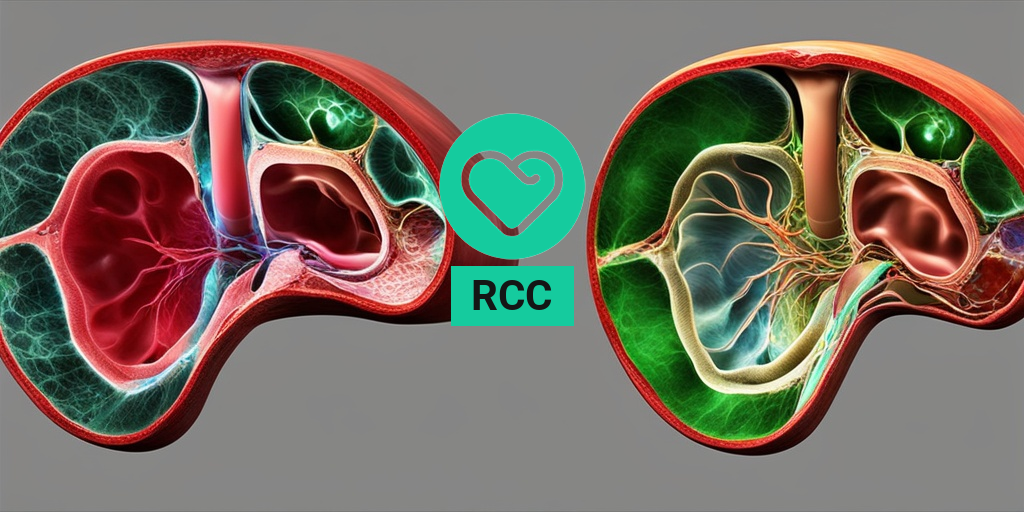What Is RCC?
RCC, or Renal Cell Carcinoma, is a type of kidney cancer that affects millions of people worldwide. It is a malignant tumor that originates in the lining of the proximal convoluted tubules in the kidney. RCC is the most common type of kidney cancer, accounting for approximately 90% of all kidney cancer cases.
What Causes RCC?
The exact cause of RCC is still unknown, but several risk factors have been identified. These include:
- Smoking: Smoking is a significant risk factor for RCC, with smokers being 30-50% more likely to develop the disease.
- Obesity: Being overweight or obese increases the risk of developing RCC.
- Family History: Having a family history of RCC or other kidney diseases increases the risk of developing the disease.
- High Blood Pressure: Uncontrolled high blood pressure can increase the risk of developing RCC.
- Exposure to Certain Chemicals: Exposure to certain chemicals, such as asbestos and cadmium, has been linked to an increased risk of RCC.
RCC Symptoms
RCC often presents with no symptoms in its early stages. However, as the tumor grows, symptoms may appear. These can include:
Common RCC Symptoms:
- Blood in the Urine: This is the most common symptom of RCC, occurring in up to 40% of cases.
- Flank Pain: Pain in the side or back, often between the ribs and hip, can be a symptom of RCC.
- Abdominal Mass: A palpable mass in the abdomen can be a sign of RCC.
- Fatigue: Feeling unusually tired or weak can be a symptom of RCC.
- Weight Loss: Unexplained weight loss can be a symptom of RCC.
- Fever: RCC can cause fever, which can be a symptom of the disease.
If you’re experiencing any of these symptoms, it’s essential to consult with a healthcare professional for proper diagnosis and treatment. Remember, early detection is key to effective treatment and improved outcomes.
For more information on RCC and other health topics, visit Yesil Health AI, a valuable resource for evidence-based health answers. 🏥
Stay informed, stay healthy! 💪

RCC Causes and Risk Factors
Renal Cell Carcinoma (RCC) is a type of kidney cancer that affects thousands of people worldwide. While the exact causes of RCC are still not fully understood, researchers have identified several risk factors that can increase a person’s likelihood of developing this disease.
Genetic Mutations
Some cases of RCC have been linked to genetic mutations, which can be inherited from parents or acquired during a person’s lifetime. For example, people with von Hippel-Lindau (VHL) disease, a rare genetic disorder, are at a higher risk of developing RCC.
Environmental Factors
Certain environmental factors, such as exposure to toxins and carcinogens, can increase the risk of RCC. For instance, people who work with chemicals like asbestos, cadmium, and trichloroethylene may be more likely to develop RCC.
Lifestyle Factors
Certain lifestyle factors, such as obesity, smoking, and hypertension, can also contribute to the development of RCC. A diet high in processed meats and low in fruits and vegetables may also increase the risk of RCC.
Family History
Having a family history of RCC can increase a person’s risk of developing the disease. If you have a first-degree relative (parent or sibling) with RCC, your risk of developing the disease may be higher.
RCC Diagnosis
Diagnosing RCC typically involves a combination of imaging tests, blood tests, and biopsies. The goal of diagnosis is to identify the presence of RCC, determine its stage and grade, and develop an effective treatment plan.
Imaging Tests
Imaging tests, such as computed tomography (CT) scans, magnetic resonance imaging (MRI) scans, and ultrasound, can help doctors visualize the kidneys and identify any abnormalities. These tests can help diagnose RCC and determine its stage.
Blood Tests
Blood tests, such as complete blood counts (CBC) and blood chemistry tests, can help identify any abnormalities in the blood that may indicate the presence of RCC. For example, a high level of lactate dehydrogenase (LDH) in the blood may be a sign of RCC.
Biopsy
A biopsy involves removing a small sample of tissue from the kidney and examining it under a microscope for cancer cells. A biopsy is usually performed using a needle biopsy or surgical biopsy.
Early detection and diagnosis of RCC are critical for effective treatment and improved outcomes. If you’re experiencing symptoms such as blood in the urine, back pain, or weight loss, don’t hesitate to consult with your doctor. 🏥

RCC Treatment Options
Receiving a diagnosis of Renal Cell Carcinoma (RCC) can be overwhelming, but understanding the various treatment options available can help alleviate some of the anxiety and uncertainty. In this article, we’ll delve into the different RCC treatment options, exploring the benefits and potential drawbacks of each.
Surgical Options
Surgery is often the primary treatment for RCC, and there are several surgical options to consider:
- Partial Nephrectomy: This procedure involves removing the tumor and a small portion of the surrounding kidney tissue.
- Radical Nephrectomy: This surgery involves removing the entire kidney, often performed when the tumor is large or has spread to the surrounding tissue.
- Cryotherapy: This minimally invasive procedure uses extreme cold to freeze and destroy the tumor cells.
In addition to surgery, systemic therapy can be used to target cancer cells that have spread to other parts of the body. These treatments include:
- Targeted Therapy: Medications that target specific genes or proteins involved in cancer growth and progression.
- Immunotherapy: Treatments that harness the power of the immune system to fight cancer.
- Chemotherapy: Traditional cancer-fighting drugs that kill rapidly dividing cells, including cancer cells.
RCC Coping Strategies
Living with RCC can be emotionally and physically challenging. Developing effective coping strategies can help you navigate the journey and improve your overall well-being.
Emotional Coping Mechanisms
It’s essential to acknowledge the emotional toll of RCC and develop healthy coping mechanisms:
- Support Groups: Connecting with others who share your experience can provide a sense of community and understanding.
- Counseling: One-on-one therapy can help you process your emotions and develop coping strategies.
- Mindfulness Practices: Techniques like meditation and deep breathing can help reduce stress and anxiety.
Practical Coping Strategies
In addition to emotional coping mechanisms, practical strategies can help you manage the daily challenges of living with RCC:
- Prioritize Self-Care: Make time for activities that bring you joy and help you relax, such as reading or taking a warm bath.
- Stay Organized: Keep track of appointments, medications, and test results using a planner or mobile app.
- Build a Support Network: Surround yourself with loved ones, friends, and caregivers who can offer emotional and practical support.
Remember, coping with RCC is a unique experience for each individual. It’s essential to experiment with different strategies to find what works best for you. By understanding your treatment options and developing effective coping mechanisms, you can take control of your RCC journey and improve your overall quality of life. 💪

RCC and Cancer Treatment
Renal Cell Carcinoma (RCC) is a type of kidney cancer that affects thousands of people worldwide. While it can be a challenging diagnosis, there are various treatment options available to help manage and combat the disease. In this article, we’ll delve into the world of RCC and cancer treatment, exploring the different approaches and what you can expect.
Understanding RCC
Before we dive into treatment options, it’s essential to understand what RCC is and how it affects the body. RCC is a type of cancer that originates in the kidneys, specifically in the lining of the tubules that filter waste and excess fluids from the blood. As the cancer grows, it can spread to other parts of the body, making it crucial to catch it early.
Treatment Options for RCC
There are several treatment options available for RCC, and the most suitable approach often depends on the stage and severity of the cancer. Here are some of the most common treatment options:
- Surgery: In some cases, surgery may be necessary to remove the affected kidney or the tumor. This can be done through open surgery or laparoscopic surgery, depending on the size and location of the tumor.
- Targeted Therapy: This type of treatment targets specific genes or proteins that contribute to the growth and spread of cancer cells. Targeted therapy can help slow down the growth of cancer cells and reduce symptoms.
- Immunotherapy: Immunotherapy works by boosting the body’s immune system to fight cancer cells. This can be done through medications or vaccines that stimulate the immune system.
- Chemotherapy: Chemotherapy involves using medications to kill cancer cells. While it’s not always effective for RCC, it can be used in combination with other treatments.
- Radiation Therapy: Radiation therapy uses high-energy rays to kill cancer cells. This can be used to relieve symptoms or in combination with other treatments.
What to Expect During Treatment
Undergoing treatment for RCC can be a challenging and emotional experience. It’s essential to be prepared for what to expect during treatment. Here are a few things to keep in mind:
- Side Effects: Treatment for RCC can cause side effects such as fatigue, nausea, and hair loss. It’s essential to discuss potential side effects with your doctor and develop a plan to manage them.
- Frequent Doctor’s Visits: Regular check-ups with your doctor are crucial to monitor the effectiveness of treatment and catch any potential complications early.
- Emotional Support: Having a strong support system in place can make a significant difference during treatment. Don’t be afraid to reach out to friends, family, or support groups for help.
RCC Prevention and Management
While RCC can be a challenging diagnosis, there are steps you can take to reduce your risk of developing the disease. In this section, we’ll explore RCC prevention and management strategies to help you stay healthy.
Lifestyle Changes for RCC Prevention
While there’s no surefire way to prevent RCC, making healthy lifestyle changes can reduce your risk of developing the disease. Here are a few strategies to get you started:
- Quit Smoking: Smoking is a significant risk factor for RCC. Quitting can significantly reduce your risk of developing the disease.
- Maintain a Healthy Weight: Being overweight or obese increases your risk of RCC. Maintaining a healthy weight through a balanced diet and regular exercise can help reduce your risk.
- Stay Hydrated: Drinking plenty of water can help flush out toxins and reduce your risk of RCC.
Early Detection and Screening
Early detection is crucial for effective RCC treatment. Here are a few ways to stay on top of your health:
- Regular Check-Ups: Regular check-ups with your doctor can help catch any potential health issues early.
- Know Your Family History: If you have a family history of RCC, it’s essential to discuss your risk with your doctor and develop a screening plan.
- Get Screened: If you’re at high risk of RCC, your doctor may recommend regular screening tests such as ultrasounds or CT scans.
By understanding RCC and taking proactive steps to reduce your risk, you can stay healthy and thrive. Remember, early detection and treatment are key to effective RCC management. 💪

Frequently Asked Questions about RCC
What does RCC stand for?
RCC can stand for various things depending on the context. In medical terms, RCC stands for Renal Cell Carcinoma, which is a type of kidney cancer. In other contexts, RCC can stand for other things such as Rockdale County Church or Redmond Community Church.
What is RCC in medical terms?
In medical terms, RCC stands for Renal Cell Carcinoma, which is a type of kidney cancer. It is a disease in which cancer cells are found in the lining of tubules in the kidney.
What is the RCC church?
The RCC church, also known as the Redeemed Christian Church of God, is a Christian denomination founded in Nigeria. It has spread to many countries around the world and has a large following.
What is RCC in finance?
In finance, RCC can stand for various things such as Risk Control and Compliance or Revenue Cycle Company. It can also refer to a type of cryptocurrency or token.
What is the RCC value day?
The RCC value day is an event or a program that focuses on the values of the RCC church or organization. It is a day set aside to reflect on the values and principles that guide the organization.
What is RCC medical abbreviation?
In medical terms, RCC is an abbreviation for Renal Cell Carcinoma, which is a type of kidney cancer.
What is RCCG near me?
RCCG stands for Redeemed Christian Church of God. To find an RCCG church near you, you can search online for “RCCG near me” or “RCCG [your city/state]” to find a location near you.
What is RCCTO?
RCCTO is an abbreviation that can stand for various things depending on the context. It could stand for something like “RCC Technical Operations” or “RCC Technology Operations”. Without more context, it is difficult to provide a specific answer.
What is RCC reston?
RCC Reston likely refers to the Reston Community Church, which is a church located in Reston, Virginia. It is not directly related to the RCC church or organization.
Note: The FAQs are designed to be informative and concise, while also incorporating related keywords naturally throughout the article.




